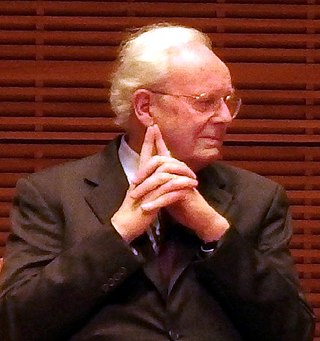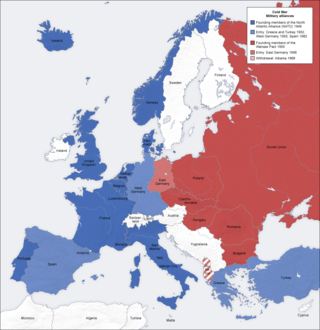External links
- Robert J. McMahon Ohio State University Department of History
- "Turning Point: the Vietnam War's Pivotal Years", McMahon's lecture for the OAH Distinguished Lectureship Program
- Appearances on C-SPAN
Dr. Robert McMahon | |
|---|---|
| Nationality | American |
| Academic background | |
| Alma mater | Fairfield University, B.A. University of Connecticut, Ph.D. |
| Academic work | |
| Discipline | International Relations |
| Institutions | University of Florida Ohio State University |
Robert J. McMahon is an American historian of the foreign relations of the United States and a scholar of the Cold War. He currently holds the chair of Ralph D. Mershon Distinguished Professor at Ohio State University.
McMahon received his B.A. from Fairfield University in 1971 and PhD from the University of Connecticut in 1977. He taught at the University of Florida from 1982 to 2005, when he moved to Ohio State University. [1] He has held visiting positions at the University of Virginia and University College Dublin. McMahon holds a joint appointment with the Mershon Center for International Security Studies at OSU.
McMahon served as 2001 president of the Society for Historians of American Foreign Relations. [2]
Noel H Pugach from the University of New Mexico, in Pacific Historical Review, calls the book an "excellent monograph" tracing the US-India-Pakistan relationship and a "solid and sound study". Pugach observes that McMahon has "exhaustively" researched primary sources from the United States and comments that the book will serve as a model reference point for studies of US-Third World relations during the Cold War. [3]
According to Kenton J. Clymer from the University of Texas in The American Historical Review it is a "superb" study of the relations between the US, India and Pakistan, which makes use of the best available archival documents. Clymer calls it an excellent work which will be a "definitive account" of American policy in South Asia during the Cold War. [4]
Richard Ned Lebow in The American Political Science Review calls it a "careful historical study" [5] while Rafique Kawthari notes in Current History that the professor of history, Robert McMahon, has relied mainly on recently declassified documents and calls the historical study timely. [6] Warren I. Cohen, from the University of Maryland's Department of History, states in Reviews in American History that Robert McMahon had already established himself as one of the best diplomatic historians and this "magnificent" book delivers "far more than its title promises". Cohen further comments that McMahon has written the best book on American relations with South Asia during the 1945-1965 period. [7]

The 1958 Lebanon crisis was a political crisis in Lebanon caused by political and religious tensions in the country that included a United States military intervention. The intervention lasted for around three months until President Camille Chamoun, who had requested the assistance, completed his term as president of Lebanon. American and Lebanese government forces successfully occupied the Port of Beirut and Beirut International Airport. With the crisis over, the United States withdrew.

John Lewis Gaddis is an American military historian, political scientist, and writer. He is the Robert A. Lovett Professor of Military and Naval History at Yale University. He is best known for his work on the Cold War and grand strategy, and he has been hailed as the "Dean of Cold War Historians" by The New York Times. Gaddis is also the official biographer of the seminal 20th-century American statesman George F. Kennan. George F. Kennan: An American Life (2011), his biography of Kennan, won the 2012 Pulitzer Prize for Biography or Autobiography.
A United States presidential doctrine comprises the key goals, attitudes, or stances for United States foreign affairs outlined by a president. Most presidential doctrines are related to the Cold War. Though many U.S. presidents had themes related to their handling of foreign policy, the term doctrine generally applies to presidents such as James Monroe, Harry S. Truman, Richard Nixon, Jimmy Carter and Ronald Reagan, all of whom had doctrines which more completely characterized their foreign policy.

Walter Fredrick LaFeber was an American academic who served as the Andrew H. and James S. Tisch Distinguished University Professor in the Department of History at Cornell University. Previous to that he served as the Marie Underhill Noll Professor of History and a Stephen H. Weiss Presidential Fellow at Cornell.

The Johnson Doctrine, enunciated by U.S. President Lyndon B. Johnson after the United States' intervention in the Dominican Republic in 1965, declared that domestic revolution in the Western Hemisphere would no longer be a local matter when the object is the establishment of a "Communist dictatorship". During Johnson's presidency, the United States again began interfering in the affairs of sovereign nations, particularly Latin America. The Johnson Doctrine is the formal declaration of the intention of the United States to intervene in such affairs. It is an extension of the Eisenhower and Kennedy Doctrines.

The Point Four Program was a technical assistance program for "developing countries" announced by United States President Harry S. Truman in his inaugural address on January 20, 1949. It took its name from the fact that it was the fourth foreign policy objective mentioned in the speech.

Dwight D. Eisenhower's tenure as the 34th president of the United States began with his first inauguration on January 20, 1953, and ended on January 20, 1961. Eisenhower, a Republican from Kansas, took office following a landslide victory over Democrat Adlai Stevenson in the 1952 presidential election. John F. Kennedy succeeded him after winning the 1960 presidential election.
Piero Gleijeses is a professor of United States foreign policy at the Paul H. Nitze School of Advanced International Studies (SAIS) at Johns Hopkins University. He is best known for his scholarly studies of Cuban foreign policy under Fidel Castro, which earned him a Guggenheim Fellowship in 2005, and has also published several works on US intervention in Latin America. He is the only foreign scholar to have been allowed access to the Cuba's Castro-era government archives.

This is an English language bibliography of scholarly books and articles on the Cold War. Because of the extent of the Cold War, the conflict is well documented.

As soon as the term "Cold War" was popularized to refer to postwar tensions between the United States and the Soviet Union, interpreting the course and origins of the conflict became a source of heated controversy among historians, political scientists and journalists. In particular, historians have sharply disagreed as to who was responsible for the breakdown of Soviet Union–United States relations after the World War II and whether the conflict between the two superpowers was inevitable, or could have been avoided. Historians have also disagreed on what exactly the Cold War was, what the sources of the conflict were and how to disentangle patterns of action and reaction between the two sides. While the explanations of the origins of the conflict in academic discussions are complex and diverse, several general schools of thought on the subject can be identified. Historians commonly speak of three differing approaches to the study of the Cold War: "orthodox" accounts, "revisionism" and "post-revisionism". However, much of the historiography on the Cold War weaves together two or even all three of these broad categories and more recent scholars have tended to address issues that transcend the concerns of all three schools.

Books about and authored by Jimmy Carter, the 39th president of the United States (1977–1981).
Sir Olaf Kirkpatrick Kruuse Caroe, was an administrator in British India, working for the Indian Civil Service and the Indian Political Service. He served as the Foreign Secretary to the Government of India during the World War II and later as the Governor of the North-West Frontier Province. As Foreign Secretary, he was responsible for reviving the McMahon Line, which included the Assam Himalayan frontier within India. After retirement, Caroe took on the role of a strategist of the Great Game and the Cold War on the southern periphery of the Soviet Union. His ideas are believed to have been highly influential in shaping the post-War policies of Britain and the United States. Scholar Peter Brobst calls him the "quintessential master of the Great Game" and the "foremost strategic thinker of British India" in the years before independence.

David S. Painter is an associate professor of international history at Georgetown University. He is a leading scholar of the Cold War and United States foreign policy during the 20th century, with particular emphasis on their relation to oil.
Nick Cullather is an American historian and professor of history at Indiana University. His research interests include US diplomatic history and intelligence, and he is notable especially for his studies of the role of the CIA in coups and nation building in Latin America.
Alastair Lamb (1930–2023) was a Chinese-born British diplomatic historian who authored several books on the Sino-Indian border dispute and the Indo-Pakistani dispute over Kashmir. He also worked in archaeology and ethnography in Asia and Africa.
This bibliography of Dwight D. Eisenhower is a list of published works about Dwight D. Eisenhower, the 34th president of the United States.
William Beatty Pickett is an American historian and professor emeritus at Rose-Hulman Institute of Technology in Terre Haute, Indiana. He is known as an authority on President Dwight D. Eisenhower and Indiana Sen. Homer E. Capehart, and is the author of several well-regarded books on U.S. history including Dwight David Eisenhower and American Power and Eisenhower Decides To Run: Presidential Politics and Cold War Strategy.

Dwight David Eisenhower and American Power is a 1995 biography of the U.S. president and military leader by historian William B. Pickett, a professor at Rose-Hulman Institute of Technology in Terre Haute, Indiana. It was published as part of Harlan Davidson's American Biographical History Series.
The United States foreign policy of the Dwight D. Eisenhower administration, from 1953 to 1961, focused on the Cold War with the Soviet Union and its satellites. The United States built up a stockpile of nuclear weapons and nuclear delivery systems to deter military threats and save money while cutting back on expensive Army combat units. A major uprising broke out in Hungary in 1956; the Eisenhower administration did not become directly involved, but condemned the military invasion by the Soviet Union. Eisenhower sought to reach a nuclear test ban treaty with the Soviet Union, but following the 1960 U-2 incident the Kremlin canceled a scheduled summit in Paris.
Penny Marie Von Eschen is an American historian and Professor of History and William R. Kenan, Jr. Professor of American Studies at the University of Virginia. She is known for her works on American and African-American history, American diplomacy, the history of music, and their connections with decolonization.